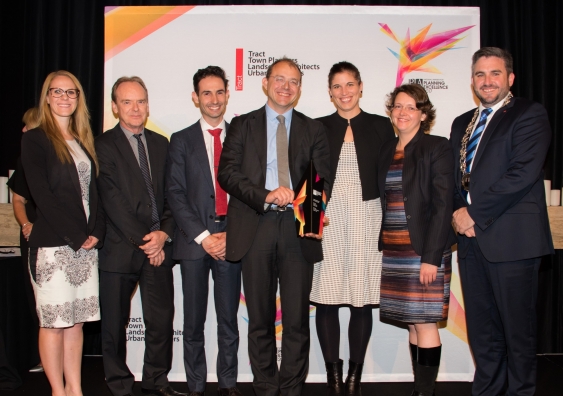Strata redevelopment research wins national planning award
UNSW’s City Futures Research Centre has received a national research award for its report on building equity into the redevelopment of old strata blocks.
UNSW’s City Futures Research Centre has received a national research award for its report on building equity into the redevelopment of old strata blocks.

UNSW’s City Futures Research Centre has received a national ‘cutting edge research’ award for its report on making the redevelopment of old strata blocks more equitable.
Renewing the Compact City is the first report in the world to explore how strata redevelopment can be made economically viable and socially fair, and has won the 2017 Planning Institute of Australia National Award for Planning Excellence in the Cutting Edge Research and Teaching category.
Funded by the Australian Research Council and a consortium of strata industry stakeholders, the research focused on a key challenge facing city planners in Australia – how to renew older areas of multi-unit housing to accommodate population growth without increasing social inequality.
The research addresses questions of feasibility and equity regarding the termination and renewal of strata schemes.
Chief Investigator Professor Bill Randolph said the replacement of older strata blocks had been largely ignored as a planning issue, but this changed when new strata-laws were introduced in NSW that required only 75% of owners to agree to collectively sell a strata block.
"In many areas now targeted for urban renewal, replacing existing multi-unit housing presents a complex challenge and poses significant issues of equity, displacement and erosion of affordable housing stock,” he said. “The project is focused on Sydney, but its findings are relevant to other cities grappling with similar challenges.
“This award is an important recognition of the City Futures Research Centre’s excellent track record in delivering timely research on complex urban policy issues with real world impacts,” Professor Randolph said.
Several of the recommendations from the research were included in the NSW strata reform legislation passed in late 2015.
City Futures Research Centre academics Dr Hazel Easthope, Associate Professor Simon Pinnegar, Dr Laurence Troy and Dr Laura Crommelin all contributed to the research.
The awards ceremony also recognised the next generation of NSW planners, with recent UNSW Built Environment graduate Richard Barry taking out the Award for Outstanding Student Project. His Bachelor of Planning research project, ‘Exploring the Virtual City – Immersive Public Participation’ using VR headsets, studied how virtual reality technology can be used to visualise proposed developments, enabling better public participation in the planning process.
National president of the Planning Institute of Australia, Brendan Nelson, said the achievements boded well for a challenging future.
“The years and decades to come will bring significant challenges for Australia’s cities, but it is evident that our urban and regional planners are up to the task. As demonstrated by this year’s many impressive award nominations, the planning profession is embracing and utilising collaborative approaches as well as the latest technology to deliver great outcomes for our communities.”